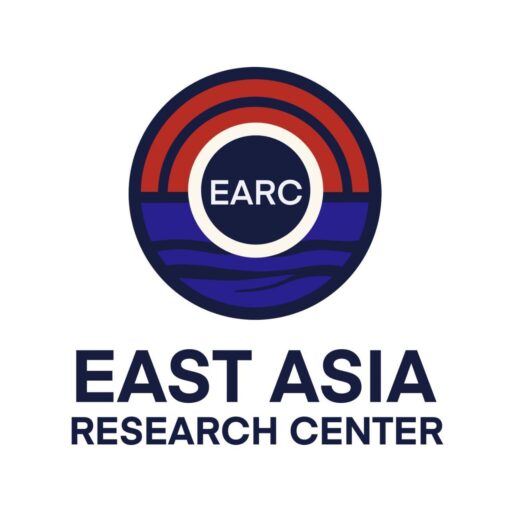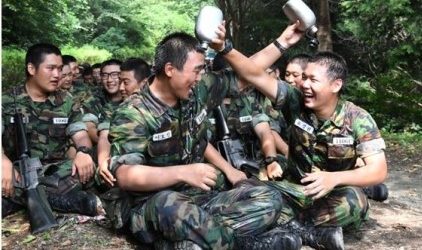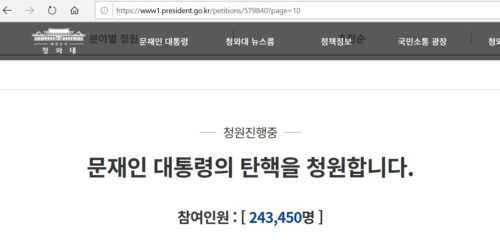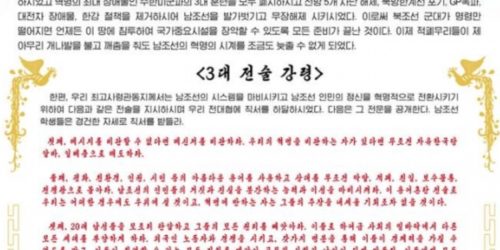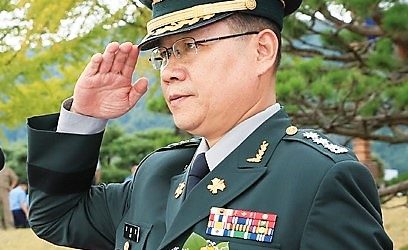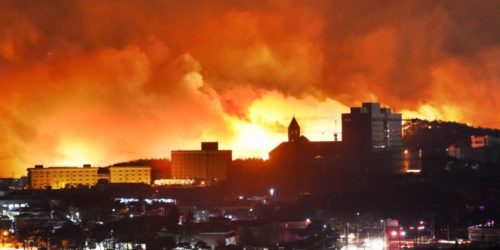South Korea Mulls Ending National Cemetery Burials for Military Veterans to Make Room for Candlelight Protesters, Considers Designating North Korean Communist Kim Won-bong “Independence Meritorious Person”
2019-2-13, Tara O
A controversy surfaced when the Ministry of Patriots and Veterans pursued an initiative to cancel burial benefits for military veterans with less than 20 years service but more than 10 years service and instead make room for the burial of those who participated in candlelight protests and those designated as “Democracy Movement Meritorious Persons.” This means certain military veterans will no longer be eligible to be buried at the national cemeteries. The Korean War Veterans Association and other veterans groups strongly opposed the move.
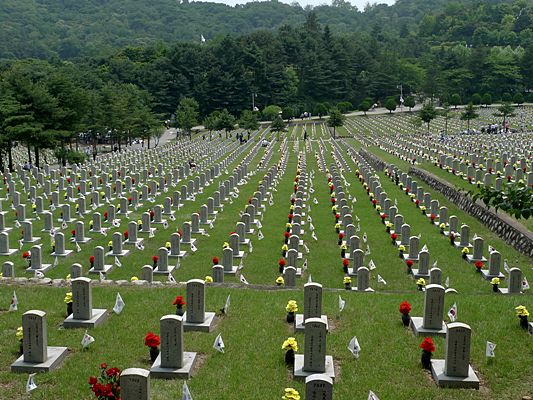
According to the National Assemblyman Ji Sang-wook (지상욱), Bareun Mirae Party, who received the recommendation of the “People-centered Patriots and Veterans Ministry Innovation Committee” or Hyeokshinwi (국민 중심 보훈혁신위원회 or 혁신위 for short), the Committee deemed the national cemetery burial beneficiaries as “too excessive.” The committee also suggested expanding the list of “Democracy Movement Meritorious Persons” to beyond the current 5.18 (Gwangju Uprising in 1980) and 4.19 (student demonstration in 1960) to include people involved in the 6.10 (protests in 1987), recent candlelight demonstrations, and others. This will increase the number of those eligible for National Cemetery burial. The committee recommended that the new groups should also be eligible for the national cemetery burials and other extensive benefits for generations.
The Hyeokshinwi is an external entity formed by the Moon administration to reform the Ministry of Patriots and Veterans. It is one of numerous external committees formed and tasked to reform and “eliminate Jeokpae (“deep-rooted evil/accumulated ills”; corruption) in every government ministry and agency. In reality, they act as a parallel government to support the policies and goals of Moon Jae-in’s Blue House and his Deoburreo Minju Party.
The Hyeokshinwi committee is comprised of 13 members, who have similar leanings to Moon and his party–what is referred to as “code” in Korea–ones who share the same way of thinking. (5:16) They include Ji Eun-hee (지은희), CEO of Justice Memory Foundation (Hyeoskshinwi chair); Kim Yang-rae (김양래), CEO of 5.18 Commemoration Foundation / Solidarity for Gwangju Citizens / Member, Gwangju Human Rights and Peace Foundation; and Seong Joon-il (성준일), Minbyun (far left “Lawyers for Democracy”) / standing member of the Patriots and Veterans Review Commission.
Pi Woo-jin, the Minister of Patriots and Veterans said they must achieve “democratization of Patriots and Veterans.” (4:07) It is unclear what the phrase means, but it could mean broadening the scope and number of the “meritorious person” designation. Minister Pi has said “there were 3 million independence movement activists, but we have only 15,000 people conferred with the honor of “meritorious persons,” which I find regrettable. So we the Ministry of Patriots and Veterans are actively looking for Independence Movement Meritorious Persons.” It is unclear where her 3 million figure came from.
Kim Won-bong as National Independence Meritorious Person?
Another controversy is Hyeokshinwi’s effort to give “National Independence Meritorious Person” designation to Kim Won-bong (김원봉) and others with communist backgrounds who conducted activities against South Korea. Hyeokshinwi wants to bestow this honor on these people for the upcoming 100th anniversary of the March 1st movement against Japan during the colonial period. Kim Won-bong was originally an anarchist, and formed an organization in 1919, which was involved in stealing, institution destruction, and VIP assassination. He was also part of the provisional government in Shanghai. He joined the Youth League of the communist party in South Korea as the honorary chair. (9:58) In 1948, he went to North Korea and joined the Korea Workers Party and received awards. During the Korean War, he conducted terrorist activities against South Korea. (10:00) He became a member of the Central Committee of the Korea Workers’ Party, and rose to be the Chairman of the Presidium of the Supreme People’s Assembly in North Korea, the same position as Kim Yong-nam, who visited South Korea during the Winter Olympics. (10:10) Kim Won-bong was purged by Kim Il-sung in 1958.
Assemblyman Ji criticized the recommendation, stating “we cannot acknowledge as ‘meritorious persons’ those who contributed to the establishment and maintenance of the North Korean regime” and “[The Moon administration and the People-centered committee] are [discarding] courtesy toward South Korean military veterans in order to inter at the national cemetery those they newly classified as national persons of merit.”
Benefits for Independence Movement Meritorious Person
The “meritorious person” designation brings recognition and gratitude to those designated. It also has tangible and generous monetary and other benefits for the designated as well as for the family members, depending on which category a “meritorious person” falls under.
For an “Independence Movement Meritorious Person,” 3 generations receive benefit (i.e., self and spouse, children, and grandchildren). The designated person receives ₩2,707,000-8,039,000 ($2,400-$7,150) per month, the spouse receives ₩721,000-2,531,000 ($640-$2,250) per month plus other benefits from the government, and the children and grandchildren each receive ₩708,000-2,191,000 ($630-$1,950) per month along with other benefits, such as priority and financial support for housing, education, and government jobs. They also receive a monthly adjustment of ₩210,000-320,000 ($187-285), depending on how many children are in the family.
By comparison, the Korean War and Vietnam War Veterans receive 300,000 won ($268) per month, after the age of 65 and their family members do not receive monthly payments or other benefits like the other categories of beneficiaries.
National Assembly Sohn Hye-won (손혜원), who is mired in multiple scandals, also received “independence movement meritorious person” designation for her father Sohn Yong-woo (손용우) in 2018 after six prior rejections. Sohn Yong-woo was rejected for the status six times because of his activities as a member of the Communist Youth League, Seoul branch of the Korea Workers’ Party (Communist Party of Korea), but was accepted in 2018, after Sohn met with Minister Pi Woo-jin. Sohn Young-woo’s organization was a branch of the Korea Workers’ Party (the party of Kim Il-sung), and it worked against South Korea’s establishment as a liberal democracy and market economy through terrorism and other treasonous activities.
Controversy roils over the growing effort by the Moon administration to recognize, honor, and pay those who have fought against the formation of South Korea as a liberal democracy. It is also unclear why the candlelight demonstrators would be eligible for National Cemetery burial as well as financial payments and other benefits. Meanwhile, it appears that those cast aside to make room at the National Cemetery for the new groups are the Republic of Korea military veterans.
